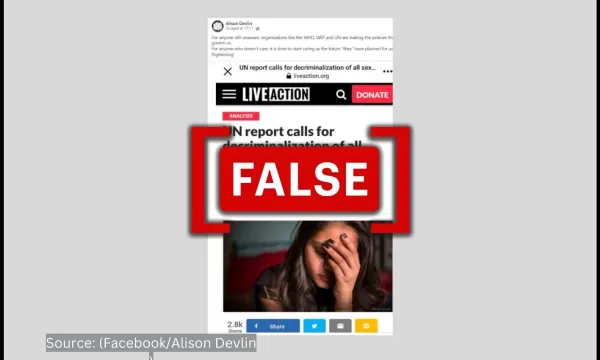By: Annet Preethi Furtado
May 2 2023

The March 8 Principles have been distorted on websites and social media. The principles do not support decriminalizing sex between adults and minors.
Context
The "March 8 Principles" report, a collaboration between the International Commission of Jurists (ICJ), the Joint United Nations Programme on HIV/AIDS (UNAIDS), and the Office of the United Nations High Commissioner for Human Rights (OHCHR), has sparked controversy as some critics claim it promotes legalizing sex with minors. Social media posts containing screenshots of an article alleging that a United Nations report advocates for decriminalizing all sexual activities, including between children and adults, have been widely circulated on platforms like Facebook and Twitter. Other claims around the report suggest that it calls for the abolition of the age of consent for sex and expresses concern about the negative impact of global organizations such as the United Nations.
However, the posts and articles have misrepresented a section of the report. The study in question aims to promote human rights and lists several criteria to consider before charging someone with a crime for engaging in consensual sex with a person under the age of 18.
In Fact
The ICJ has clarified that the March 8 Principles have been "seriously misrepresented on a number of social media and websites." A statement from the body emphasizes that the report does not support the decriminalization of sexual conduct with children or the repeal of the legally mandated minimum age of consent for sexual activity.
Stéphane Dujarric, a spokesperson for the United Nations, addressed the false allegations regarding the report at a press briefing, calling them "malicious misreporting on a recent report on the age of legal consent." Dujarric further said, “In the application of law, it is recognized that criminal sanctions are not appropriate against adolescents of similar ages for consensual non-exploitative sexual activity… The UN is resolute in fighting the sexual exploitation of children, upholds that sexual exploitation and abuse of children is a crime, and supports countries to protect children.”
Contrary to the social media post's claim, the report refers to the sexual activity of adolescents, not children. It is important to note that while the United Nations Convention on the Rights of the Child defines a child as an individual aged between 0 and 18 years, the United Nations and the World Health Organization have officially defined adolescence as a period between the ages of 10 and 19 years. The study in the “Foreword” on Page 2 and the “Introduction” on Page 7 mentions that the purpose of the principles is to provide a precise legal structure and practical guidance on applying criminal law to conduct linked with consensual sexual activities. It mentions that the guidance is based on general principles of criminal law and international human rights law and standards and covers “consensual sexual activities, including in such contexts as sex outside marriage, same-sex sexual relations, adolescent sexual activity, and sex work."
The fake and misleading posts distort a part of the report that deals with the consensual sexual behavior of adolescents, found on pages 22 and 23 of the 26-page report - The 8 March Principles.
The report's "PRINCIPLE 16 - CONSENSUAL SEXUAL CONDUCT" section emphasizes that, regardless of the circumstances or the parties involved, consenting sexual conduct cannot be criminalized. However there is a clear caveat specified to this – when enforcing criminal law, the minimum age of consent for sexual activity must be applied without discrimination based on gender or the legal age of marriage.
The report acknowledges that, in some cases, sexual activity where the participants are adolescents below the minimum legal age of consent may be consensual, despite being technically illegal. The enforcement of criminal law must consider the rights and capacity of individuals under 18 to make informed decisions about engaging in consensual sexual activities with others under the age of 18, and their right to be heard in matters concerning them.
Logically Facts contacted Ton Liefaard, a Children's Rights Professor at Leiden University in the Netherlands, to clarify what the March 8 Principles say about these issues. Liefaard stated that the allegations about the report were “serious and flawed” and pointed us to his comment to PolitiFact. Speaking to PolitiFact, Liefaard said the principle prevents the criminalization of sexual conduct between adolescents and that the criminalization of sex with minors with adults is not meant to be affected by this principle.
Logically Facts also contacted the UNAIDS for a statement. Clarifying that the report had been misinterpreted, Christine Stegling, UNAIDS Deputy Executive Director for Policy, Advocacy, and Knowledge, remarked: “In the application of law, it is recognized that criminal sanctions are not appropriate against adolescents of similar ages for consensual non-exploitative sexual activity. So too, it is recognized that adolescents should not be prevented from accessing health services which protect them.'' She mentions, ''The U.N. is resolute in fighting the sexual exploitation of children, upholds that sexual exploitation and abuse of children is a crime, and supports countries to protect children."
The Verdict
Unlike what the widely circulated assertions imply, the ICJ report did not support the decriminalization of sex with minors or propose the elimination of a minimum age of consent. Instead, it urged law enforcement to consider the perspectives and statements of the young people involved where all participants are under the official age of consent. Therefore, we have marked this claim as false.